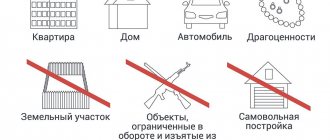1. Robbery, that is, open theft of someone else’s property, -
shall be punishable by compulsory labor for a term of up to four hundred eighty hours, or correctional labor for a term of up to two years, or restriction of freedom for a term of two to four years, or forced labor for a term of up to four years, or arrest for a term of up to six months, or imprisonment for up to four years.
2. Robbery committed:
a) by a group of persons by prior conspiracy;
b) has become invalid. — Federal Law of December 8, 2003 N 162-FZ;
c) with illegal entry into a home, premises or other storage;
d) using violence that is not dangerous to life or health, or with the threat of using such violence;
d) on a large scale, -
shall be punishable by forced labor for a term of up to five years, or by imprisonment for a term of up to seven years, with a fine in the amount of up to ten thousand rubles or in the amount of the wages or other income of the convicted person for a period of up to one month, or without it, and with restriction of freedom for a term of up to one year. or without it.
3. Robbery committed:
a) an organized group;
b) on an especially large scale, -
c) has become invalid. — Federal Law of December 8, 2003 N 162-FZ
shall be punishable by imprisonment for a term of six to twelve years with or without a fine in the amount of up to one million rubles or in the amount of the wages or other income of the convicted person for a period of up to five years and with or without restriction of freedom for a term of up to two years.
- Article 160. Misappropriation or embezzlement
- Article 162. Robbery
What is robbery
Robbery is one of the types of theft described in Chapter 8 of the Criminal Code of the Russian Federation. Its exact definition is given in Article 161 of the Criminal Code of the Russian Federation. So, in accordance with this article, robbery is the open theft of someone else's property. In this case, the robber does not use violence, and nothing threatens the health and life of the victim. By type, this crime against property is the simplest.
Please note that violent robbery is robbery, which is regulated by Article 162 of the Criminal Code of the Russian Federation.
The subject of robbery is exclusively movable bodily things. For example, a smartphone, wallet, etc. But the seizure of living space or land does not qualify as robbery.
As a rule, street robberies are committed by unorganized groups of people. If the robbery was carried out by a group of persons by prior conspiracy, such robbery will be with aggravating circumstances.
The amount of robbery for initiating a criminal case in accordance with Article 161 of the Criminal Code of the Russian Federation does not matter. Moreover, if something minor was stolen, the police may refuse to initiate a case, citing Article 14 of the Criminal Code of the Russian Federation, arguing that the crime is minor and does not pose a danger to society. In this case, not only the value of the stolen property will be taken into account, but also the circumstances in which the robbery was committed, as well as the characteristics of the robber.
When did you steal and when did you rob? Comparison of formulations
The classification of thefts and robberies often causes difficulties not only for ordinary citizens of the Russian Federation, but also for officials who conduct an investigation into the case. Despite the fact that both of these crimes are based on a single goal - the unlawful taking of someone else's property without subsequent return to its owner, they differ in many ways.
Theft is the secret theft of someone else's property (that is, in the absence of the owner of the item and other persons who could witness the incident). In addition, the crime will be considered theft even if the thief was noticed by someone (for example, caught by a video camera installed on the street), but was sure that he acted unnoticed by others. Theft is also the taking of someone else's property in the presence of witnesses if they do not suspect the criminal's malicious intent.
Unlike theft, robbery implies the theft of property in the open - that is, in the presence of the owner of the thing or third parties. At the same time, witnesses to the crime must be aware of the illegality of the robber’s actions, even if they made no attempt to stop him.
Another difference is the fact that theft cannot be accompanied by violence in any form, since the thief carries out all actions secretly. If, in the process of committing a crime, the offender used violence (not dangerous to life and health) or threatened to use it, this will be considered robbery.
In case of theft, the value of the stolen property must be more than 1000 rubles, and in case of robbery, the amount of the stolen property does not play any role, the fact of the attack itself is important.
Corpus delicti
In accordance with the article for robbery, the crime is determined by 4 main components:
- the subject is a criminal, a capable citizen over the age of 14;
- subjective side - direct intent;
- the object of robbery is property rights;
- the objective side is the open and illegal seizure of someone else’s property, which is carried out in the presence of the owner and/or third parties;
- the goal is the desire to increase one’s material well-being, self-interest.
The crime is considered completed only when the criminal was able to sell the stolen property and receive money for it, give it to someone, keep it for himself, or carry out other actions. If the criminal did not have such an opportunity, for example, if he was detained immediately after the robbery, the act will be regarded as an attempted robbery and is regulated under Articles 161 and 30 of the Criminal Code of the Russian Federation.
It is worth noting that if the purpose of the crime was not self-interest (for example, property is confiscated for the purpose of temporary use), the actions of the criminal will be qualified under Article 330 of the Criminal Code of the Russian Federation “Arbitrariness”.
If a citizen does not take part in a robbery, but is the organizer of a crime that involves persons who cannot be held accountable under Article 161 of the Criminal Code of the Russian Federation (for example, children under the age of 14), the organizer is still liable for the crime.
The difference between robbery and related crimes
Robbery is often confused with other types of theft, but there are nuances that distinguish crimes from each other. The difference between theft and robbery is that the criminal carries out the theft secretly for the victim, and in robbery the criminal knows that the theft is not a secret for the victim and/or witnesses.
The difference between robbery and robbery is that robbery is an attack with the purpose of robbery, i.e. During the theft process, the offender uses violence or threatens to use violence that is dangerous to the health and life of the victim. No violence is used during the robbery.
Robbery differs from fraud in that theft in fraud is carried out using deception. Those. the victim does not realize that a crime is being committed against him and gives up his property voluntarily.
The difference between robbery and extortion is that during extortion, the criminal demands the transfer of property using threats.
Please note that there is no such crime as armed robbery in law. Such an act is qualified as robbery and is punishable under Part 2 of Article 162 of the Criminal Code of the Russian Federation.
Consideration of the parties
The objective side includes the socially dangerous side of the act, in this case it is the open theft of someone’s property. For a crime to have the nature of robbery, two conditions must be met: first, the criminal is aware that he is committing theft openly, in front of other people who are not accomplices in the crime. If the guilty person did not suspect that others saw his illegal actions, then the crime cannot be classified under this article. Secondly, eyewitnesses to a crime understand the nature of the criminal’s actions. Not only must these conditions be met, they must be proven both by the investigative authorities and the court, in accordance with the provisions of the criminal procedural legislation of the Russian Federation.
Crime occurs through actions. The main sign of theft is the actual taking of someone else's property by the guilty person, without any legal grounds and the consent of the owner.
The object of the crime (what the criminal encroaches on) is the property interests of the victim. The object can be a thing, money, or securities. Also, along with the object, there is an object. The latter includes the property itself, which has a certain value (you must remember that the object is always ideal, and the object is material).
The subjective side is in the form of intent, intent is direct (to take possession of someone else’s property). The goal is self-interest. The criminal wants to receive some kind of material benefit and is aware of this.
As the code says, the subject of a crime under this article is a person who has reached the age of 14 and is of sound mind. Also in this case the subject is simple. The act is completed at the moment when the criminal takes possession of someone else's property.
Qualifying signs of robbery
The qualifying signs of robbery are listed in Article 161 of the Criminal Code of the Russian Federation. In accordance with the law, there are the following types of robbery:
- with illegal entry into premises (residential or non-residential);
- carried out by a group of persons by prior conspiracy;
- grand robbery;
- carried out by an organized group;
- with the use of violence that is not dangerous to the life and health of the victim;
- robbery on an especially large scale.
A specific feature of robbery is that the offender may use violence that is not life-threatening or threaten to use violence (for example, holding the victim's hands, tying him up, etc.).
Expertise appointed during the investigation of robberies and robberies:
- traceological to study traces of a break-in;
- dactyloscopic to study the fingerprints of the criminal;
- medical to determine the degree of damage to the victim’s health;
- forensic merchandising to determine the value of stolen property.
What type of crime is robbery?
Depending on the nature and degree of danger of the crime for society, all offenses listed in the Criminal Code of the Russian Federation are classified into several categories:
- of minor gravity - these are acts committed intentionally or through negligence, the maximum punishment for which does not exceed 3 years of imprisonment;
- of medium gravity - intentional acts, the commission of which is punishable by no more than 5 years of imprisonment, as well as crimes committed through negligence, with a sentence of more than 3 years in prison;
- grave - these are intentional acts, the maximum punishment for which does not exceed 10 years in prison;
- especially serious - these are intentional crimes, providing for a term of imprisonment for a period of more than 10 years or another, more severe punishment;
Note! Robbery is qualified under Art. 161 of the Criminal Code of the Russian Federation, the first part of which assumes an average degree of severity of the crime, the second - grave, and the third - especially grave.
To summarize, it should be noted that when qualifying crimes of this kind, many controversial situations usually arise. Many investigators and even judges often confuse robbery and robbery, since the first often turns into the second. Robbery is a more serious act and carries a more severe punishment.
In order to understand all the intricacies of your case and avoid unnecessary troubles, seek help from a qualified lawyer. The specialist will explain your rights to you, and if necessary, conduct his own legal investigation, find new evidence and facts that speak in your favor.
Punishment for robbery under the Criminal Code of the Russian Federation
How many years they get for robbery is specified in Article 161 of the Criminal Code of the Russian Federation. For example, in accordance with it, for robbing a bank or store they will give (if the crime was committed without aggravating circumstances):
- compulsory work up to 480 hours;
- correctional labor for up to 2 years;
- forced labor for up to 4 years;
- restriction of freedom for a period of 2 to 4 years;
- arrest up to 6 months;
- imprisonment for up to 4 years.
The court may order one of the listed measures. The sentence depends on the circumstances under which the crime was committed and the characteristics of the offender.
If the act was committed with aggravating circumstances - robbery by a group of persons by prior conspiracy, with the use of violence not dangerous to the life and health of the victim, on a large scale or with illegal entry into the premises, the punishment is imposed in accordance with Part 2 of Article 161:
- forced labor for up to 5 years;
- imprisonment for up to 7 years.
As an additional measure, the court may impose a fine of up to 10,000 rubles, or in the amount of income for a period of up to 1 month, and/or restriction of freedom for up to 1 year.
If the crime was committed with aggravating circumstances under Part 3 of Article 161, the term of imprisonment will be from 6 to 12 years. In addition, the court may impose a fine of up to 1 million rubles or the amount of income for a period of up to 5 years, as well as restriction of freedom for up to 2 years.
Please note that the law provides for criminal liability for robbery committed by a minor. All citizens over the age of 14 are responsible for robbery.
For attempted robbery, punishment is imposed in accordance with Article 30 of the Criminal Code of the Russian Federation.
Gravity of the crime committed:
- for part 1 – moderate severity;
- for part 2 – serious;
- for part 3 – especially serious.
Do you need a lawyer?
Should I look for an experienced private lawyer or should I trust a public defender? Despite the fact that the sanction of Article 161 of the Criminal Code of the Russian Federation is an alternative one, you should not expect that the court will impose a punishment not related to imprisonment. As we have seen, the courts prefer to place citizens who have committed robbery in colonies. And the state lawyer has little motivation to ensure that his client does not receive a real prison sentence. Therefore, it is better to entrust the case to a qualified criminal lawyer.
Ideally, the lawyer seeks to conclude the criminal case (prosecution) as early as possible, before the preliminary investigation stage comes to an end. If this goal could not be achieved, the defender will strive to turn the situation in favor of his client further. So, it can achieve the following results:
- issuance of an acquittal;
- reclassification of the act to an article providing for a less severe punishment (for example, from robbery to theft);
- reclassification of the act to a part of the article providing for a less severe punishment (for example, from Part 3 to Part 1 of Article 161 of the Criminal Code of the Russian Federation);
- imposing the most lenient punishment without applying additional punishment provided for in the sanction of the article;
- assignment of a suspended sentence;
- assistance in parole.
If we are talking about victims of robbery, then the lawyer will help, firstly, to achieve the initiation of a case and bring the perpetrators to criminal responsibility, and secondly, will contribute to the recovery of fair monetary compensation from the convicted persons.
Contacting a lawyer at an early stage significantly increases the chances of a successful outcome of the case. However, you can also enlist the help of a specialist after the fact, when the verdict has already been passed: it is likely that the defense attorney will be able to find important “clues” and appeal the judicial act.
How to act in case of robbery
During a robbery, you should remain calm and try to remember the face of the criminal. This may help law enforcement agencies later recover his identity. It is also worth collecting information about all eyewitnesses, as they may become witnesses.
Immediately after you have been robbed you need to contact the police. First of all, you should call the duty station and report the robbery.
Please note that to initiate a criminal case, a statement to law enforcement agencies is not necessary, since robberies are matters of public prosecution. If the police have doubts that a crime has been committed, a pre-investigation check must be carried out within 30 days. Based on its results, a decision is made to initiate a case.
If you decide to file a complaint, you need to contact the police department of the area where the crime occurred.
If law enforcement agencies refuse to initiate a case, contact our lawyer for help. He will tell you how to proceed and help you defend your rights.






